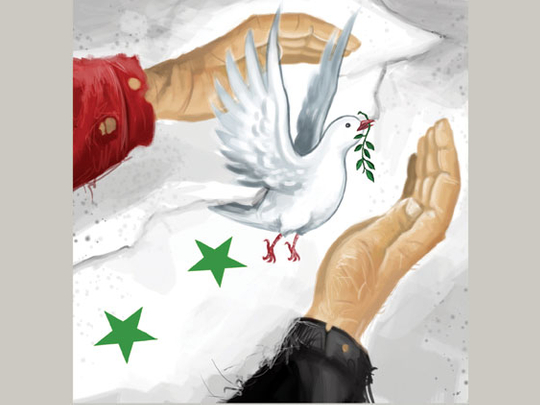
Friends and acquaintances regularly told me, “You can write about anything you want,” during my five-year stay in Syria. “But do not touch politics or religion.”
For Syrians, the open discussion of politics was something on few people’s minds. Before the current revolt took hold, managing to secure a good job — in spite of crippling graft and sparse opportunities — was a far more pressing concern.
Pre-March 2011, the vast majority of Syrians I know kept their heads down and enjoyed life as they could. In wealthy areas of the country, politics and open discussion were gladly sacrificed for economic security and streets where their children could play in peace.
Before the uprising, western-styled malls were flung up in Aleppo, Damascus and one on the outskirts of Homs. New private banks made cheap credit available to thousands of young men and women, wanting to buy houses and cars, and to get married. The Damascus Securities Exchange opened in 2009. A Mediterranean cafe culture swelled in the major cities.
But there was also an emerging anger that few well-to-do Syrians ever saw: The suburbs around Aleppo and Damascus, and in Daraa, became cramped with displaced farmers and labourers from Syria’s Jazeera region to the east; hundreds of thousands had fled a three-year drought from 2008 and came to the cities in search of work. They moved to Qaboun, Harasta and Douma — all districts we are familiar with today.
The brutal arrogance immediately adopted by the Syrian regime to the current uprising meant it was doomed from the revolt’s beginning. There was a way for it to stay in power had it, at the beginning, engaged in serious dialogue with Syrian society and taken seriously the grievances of the poor. It could have released the many political prisoners (themselves a sideshow to this revolution) and asked international observers to monitor real elections. It could have allowed commentators and journalists to write freely in media forums.
The regime was relatively popular before the revolt. Syrians looking east and west to Iraq and Lebanon counted stability as a blessing. The government’s at-least-rhetorical opposition to Israel served to unite many around it.
But it chose the way of the gun. It chose to take on the thousands without jobs or money. It used weapons and torture against these people. As the death toll mounts, and Al Assad is offered “safe passage” by the Arab League, Syrians will of course be far better off without him.
The Syrian people have given their lives in their attempts to depose one dictator, they won’t likely settle for another taking Al Assad’s place. If future governments cannot provide electricity, water and jobs then they too will be shipped out. If the current opposition figures cannot act where they have been talking for years, they will be left on the sidelines. This is not a society prepared to settle for the guile of waffling politicians.
Furthermore, any likeness with Lebanon and Iraq are misplaced because of the widely differing population breakdowns. The Iraqi and Lebanese civil conflicts were fought between groups with relatively equal demographic numbers. In Syria, however, only 10 per cent (the Alawite population) will likely feel threatened enough to pick up guns. Christians and others fearful of the revolt movement will not pick up guns and fight for Alawites. As they have done during the revolt, they will likely stand by.
Significant difficulties do await Syrian society. Time and patience will be required. It will take decades for the country to recover from 40-plus years of the Al Assad rule, the socialist economic programmes it followed and the assorted ills it cultivated.
Animosity between the largely Sunni protest movement and the minorities who stood by and watched Al Assad’s forces slaughter them will have to be ironed out and discussed on a countrywide scale. There will be many more deaths, even after the regime is ousted. Syrians will have to partake on one key activity: To listen to each other. For the country’s minorities and for those fearing a conservative government replacing Al Assad, they must consider themselves Syrians first and Alawite, Christian, Kurd second.
Damascenes regularly speak of the 1940s and 50s when Syria’s street stalls were flooded with newspapers and political satires. The open discussion of politics did not help forge stability then and it is not likely to do so after the Al Assad regime falls. But providing space for dialogue that runs both ways between activists and minorities will be a start.
— Guardian News & Media Ltd









